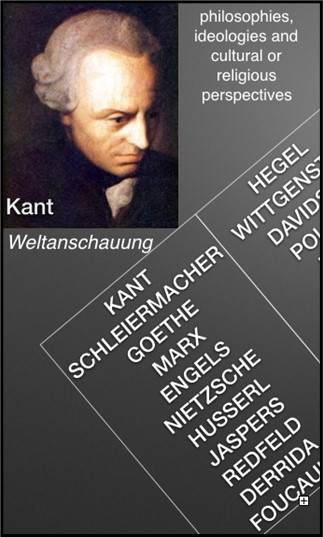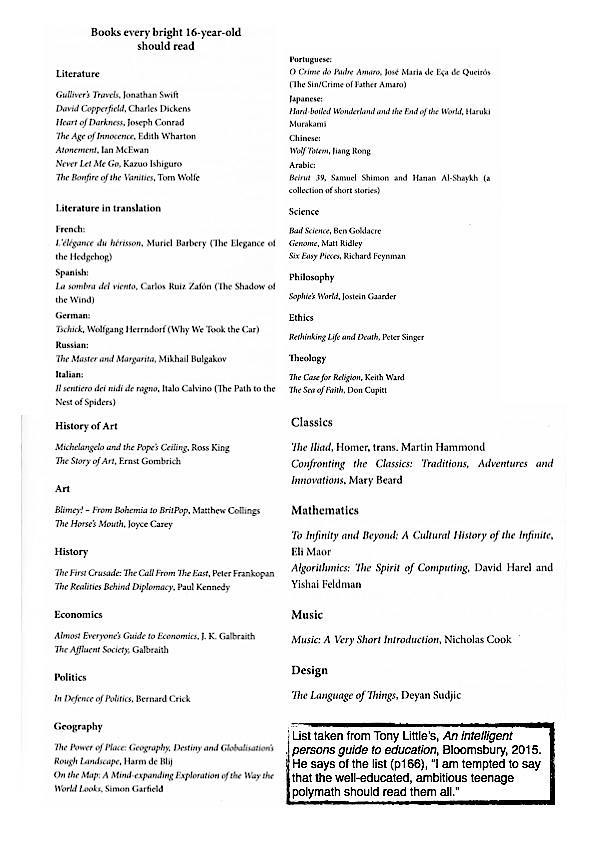Sixth Form Courses
Why do IDEAS?
A unique opportunity in the Ecclesbourne Sixth Form to extend your education beyond the confines of A-level study.
What is a good education?
 What is a good education? Ecclesbourne is very good indeed at enabling students to play the exam game and do well. It is also a fantastic place to develop many extra-curricular interests, COVID restrictions notwithstanding! You are indeed a privileged bunch. Be grateful and make the most of it all! But there is more to being educated than qualifications and certificates. You have and will be involved a range of other interesting things which are never examined. Most of life’s good stuff isn’t measurable in that way anyway!
What is a good education? Ecclesbourne is very good indeed at enabling students to play the exam game and do well. It is also a fantastic place to develop many extra-curricular interests, COVID restrictions notwithstanding! You are indeed a privileged bunch. Be grateful and make the most of it all! But there is more to being educated than qualifications and certificates. You have and will be involved a range of other interesting things which are never examined. Most of life’s good stuff isn’t measurable in that way anyway!
IDEAS had its genesis in asking the question, “What can we do to enhance the intellectual and cultural development of able students?” Hence the acronym IDEAS - Intellectual Development, Extending Able Students. We do an amazing job with less able youngsters. Enhanced Learning has been a jewel in the crown here for many years. So what about those who revel in the sort of stuff celebrated and valued in our best universities? What about the sort of stuff that features on University Challenge? What about learning for its own sake, just because it is interesting and life affirming? Where study is an end in itself rather than a means to an end.
SOME HISTORY
 Historically we taught AS level Philosophy to a select group of the Lower Sixth in an attempt to meet this perceived need. It worked well as a forum for exploring some significant ideas and ways of thinking through the work of great minds such as Plato, Aristotle, Descartes, Hume, Mill, Nietzsche and Russell. But is was heavily text based, constrained by a syllabus and had to be examined and graded. Some of the best stuff we did always seemed to be tangential to the text in hand. The most rewarding discussions were often ‘off topic’ and pulling on other disciplines and sources. These things could not be examined or rewarded. So with the advent of significant changes to the way A-levels were constructed in 2000, not least the watering down of AS level work, the decision was made to drop AS Philosophy and replace it with a home grown course. The benefits have chiefly been as follows. Moving away from heavily text based study enfranchised a wider base of students. Removing the narrow focus on philosophy allowed us to add many more significant and important areas of human experience and learning. Taking the exam away reduced the pressure to play yet another conventional qualifications game. You could come to IDEAS just because it was interesting. It iced the cake of the A-level package with a different sort of lesson. Latterly, since the demise of General Studies, it provides one of the only spaces within which we can explore ideas just because they are interesting. To quote a previous student, ‘It is the place where you can do cool stuff’.
Historically we taught AS level Philosophy to a select group of the Lower Sixth in an attempt to meet this perceived need. It worked well as a forum for exploring some significant ideas and ways of thinking through the work of great minds such as Plato, Aristotle, Descartes, Hume, Mill, Nietzsche and Russell. But is was heavily text based, constrained by a syllabus and had to be examined and graded. Some of the best stuff we did always seemed to be tangential to the text in hand. The most rewarding discussions were often ‘off topic’ and pulling on other disciplines and sources. These things could not be examined or rewarded. So with the advent of significant changes to the way A-levels were constructed in 2000, not least the watering down of AS level work, the decision was made to drop AS Philosophy and replace it with a home grown course. The benefits have chiefly been as follows. Moving away from heavily text based study enfranchised a wider base of students. Removing the narrow focus on philosophy allowed us to add many more significant and important areas of human experience and learning. Taking the exam away reduced the pressure to play yet another conventional qualifications game. You could come to IDEAS just because it was interesting. It iced the cake of the A-level package with a different sort of lesson. Latterly, since the demise of General Studies, it provides one of the only spaces within which we can explore ideas just because they are interesting. To quote a previous student, ‘It is the place where you can do cool stuff’.
CONTENT
This varies from year to year and is often shaped by requests from students and occasional presentations by students themselves. We have looked amongst other things into ‘Greek Gods in Western Art’, ‘Einstein and Eddington’, ‘The Prisoners’ Dilemma’, ‘Postmodernity’, ’Fractal Geometry’, ‘Quantum Mechanics for beginners’, ’Homer’s Odyssey', ‘God and time’, ‘What is Beauty?’ and asked‘When is a kiss adulterous?’ Some of us learned to play Bridge. Others shared their Desert Island Discs including the Headmaster guesting in a lesson.
We have played some innovative games including PATHETIC! We now know something about Worldviews and what is meant by Post Truth. In other words, IDEAS is a smorgasbord of possibilities spanning a range of disciplines.
2020-21 students will be the first to engage with a whole new package of goodies put together during the lockdown and looking at ‘An overview of western art’, ‘The Renaissance’, ‘The Reformation’, ‘The Enlightenment’, ‘Romanticism’ and ‘Modernity’. There really are no ‘off-limits’ topics in IDEAS.
CONDITIONS FOR JOINING
Typically students in IDEAS have accrued at least half a dozen top grades (i.e. 9, 8, 7) at GCSE. If this course is to be true to its name and ice the cake of other pursuits, your basic A-level cake should not have a soggy bottom!
COMMITMENT
Not everyone can make every session. It depends on individual timetables. The expectation is that once signed up, you stay the course unless you negotiate in the light of other pressures. It is no disgrace to find that IDEAS is not for you having given it a go. Timetables can be sorted in September.
CONSEQUENCES OF BEING IN IDEAS
The hope is that you enjoy the journey. It ought to stretch and challenge you to think in new ways and abandon some cherished errors. It should give you extra things in your intellectual toolkit which will be of use, not least in assaying new material. You might find yourself a tad more cultured than you were and aware of new vistas, even if they do not become your favourite things. It might even make you cleverer and somewhat less intimidated by the world of Oxbridge and Russell Group universities which are likely destinations of most IDEAS graduates.
SUMMER READING CHALLENGE
This is a fantastic time to forget all that exam related stuff and do some serious reading! Are you aware of the Everyman Millennium Books collection in the Library? Beautiful editions of classic works offering a chance to read Sartre, Kafka, Dostoevsky, Hardy or whatever Big Name authors you have missed hitherto. Do you ever sit down with an article from Encyclopedia Britannica and read it? My own set would be my Desert Island Discs book choice. Have you read Bryson’s ‘Short History of Everything’? Are you aware of the superb overviews of subjects like Psychology, Shakespeare or Science from Dorling Kindersley? Or their introduction to the History of Philosophy? In some ways it does not matter what you read - but read something challenging and enlightening before you put on that suit in September. Then carry on reading more! It is probably the difference between the best and the rest. Most properly educated people have their own libraries and add to them.
I have attached a photocopy of the list of recommendations found in Tony Little’s excellent book on Education. He is the ex Head of Eton. You may find his expectations intimidating, but dip into his list and think about what some students in some schools are possibly reading. Know the competition!


Time Commitment
Ideas is a minimum of two hours a week taught lessons